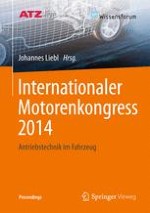2014 | OriginalPaper | Chapter
Corona ignition for natural gas engines with charge dilution
Authors : Steffen Bohne, Georg Rixecker, Dr., Volker Brichzin, Dr., Michael Becker, Dr.
Published in: Internationaler Motorenkongress 2014
Publisher: Springer Fachmedien Wiesbaden
Activate our intelligent search to find suitable subject content or patents.
Select sections of text to find matching patents with Artificial Intelligence. powered by
Select sections of text to find additional relevant content using AI-assisted search. powered by
Triggered by upcoming legislation enforcing lower CO
2
emissions, CNG as an alternative fuel for passenger car engines has recently gained more importance. As the CO
2
emission of a natural gas engine is on average 20 % lower as compared to its gasoline counterpart, CNG engines play an important role in reaching the prescribed fleet average CO
2
emission limits. Consequently the last few years saw the introduction of CNG applications in different vehicle classes from almost every larger OEM, especially in Europe. In addition, particle emissions are close to zero which is an important advantage over Diesel engines. Per today’s legislation CNG as a fuel benefits from lower taxation resulting in substantial cost savings for the customer, which at least partially compensates for the additional cost of the CNG system.
Similar to gasoline engines, CNG engines benefit from EGR and lean combustion strategies to improve fuel efficiency in particular at part load. The lower calorific value of the combustible air-fuel mixture of CNG can be compensated by turbocharging. In order to benefit from the high octane number of natural gas, the compression ratio of the engines is oftentimes increased. Both aspects put high demands on the ignition system.
In comparison, natural gas as a fuel for stationary industrial engines is already very much established and allows combined electrical and thermal efficiencies in excess of 85 % to be reached in modern heat and power co-generation plants. An increasing use with heavy duty trucks and buses can also be seen, as operating cost is an even stronger driver than in the case of passenger cars and gas storage is, in many applications, not that much of an issue. Moreover, CO
2
emissions are becoming more important for heavy duty applications, too, and huge natural gas reserves have been found recently. To obtain the highest possible fuel consumption benefits a heavy duty gas engine needs to be operated lean and in a window where a stable operation can be achieved avoiding knock at lower as well as misfire at higher air/fuel ratios. The ignition system is of particular importance to push this window to air/fuel ratios which are most efficient and, as important, result in lowest NO
x
emissions.
